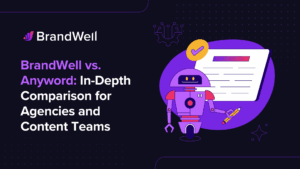AI writing tools are everywhere. But while some promise SEO-friendly, long-form content in minutes, others fall short, leaving you with generic fluff Google won’t even glance at.
If you’re choosing between BrandWell vs AI-Writer, you’re likely looking for a tool that can actually replace hours of writing, not just automate word dumps.
So, which tool gives you content that ranks, engages, and converts?
We’ve tested both platforms extensively and broken down everything from writing quality and SEO tools to ease of use, support, and pricing.
Whether you’re a blogger, content manager, or digital marketer, this comparison will help you decide:
Is BrandWell’s new AI agent ecosystem worth switching to, or does AI-Writer.com still hold up in 2025?
Table Of Contents:
- BrandWell vs. AI-Writer: Quick Overview
- Inside BrandWell: What Makes It a Standout SEO Tool
- Inside AI-Writer: What You Get (and What You Don’t)
- How BrandWell and AI-Writer Compare
- SEO Optimization: How Do These AI Tools Stack Up?
- AI Detection and Originality: How Human Do These Tools Sound?
- Pricing: Best Value for Money?
- Real World Example: Generating Content with BrandWell and AI-Writer
- Making Your Choice: BrandWell vs AI-Writer
- Final Thoughts: The AI Writer You Choose Shapes the Results You Get
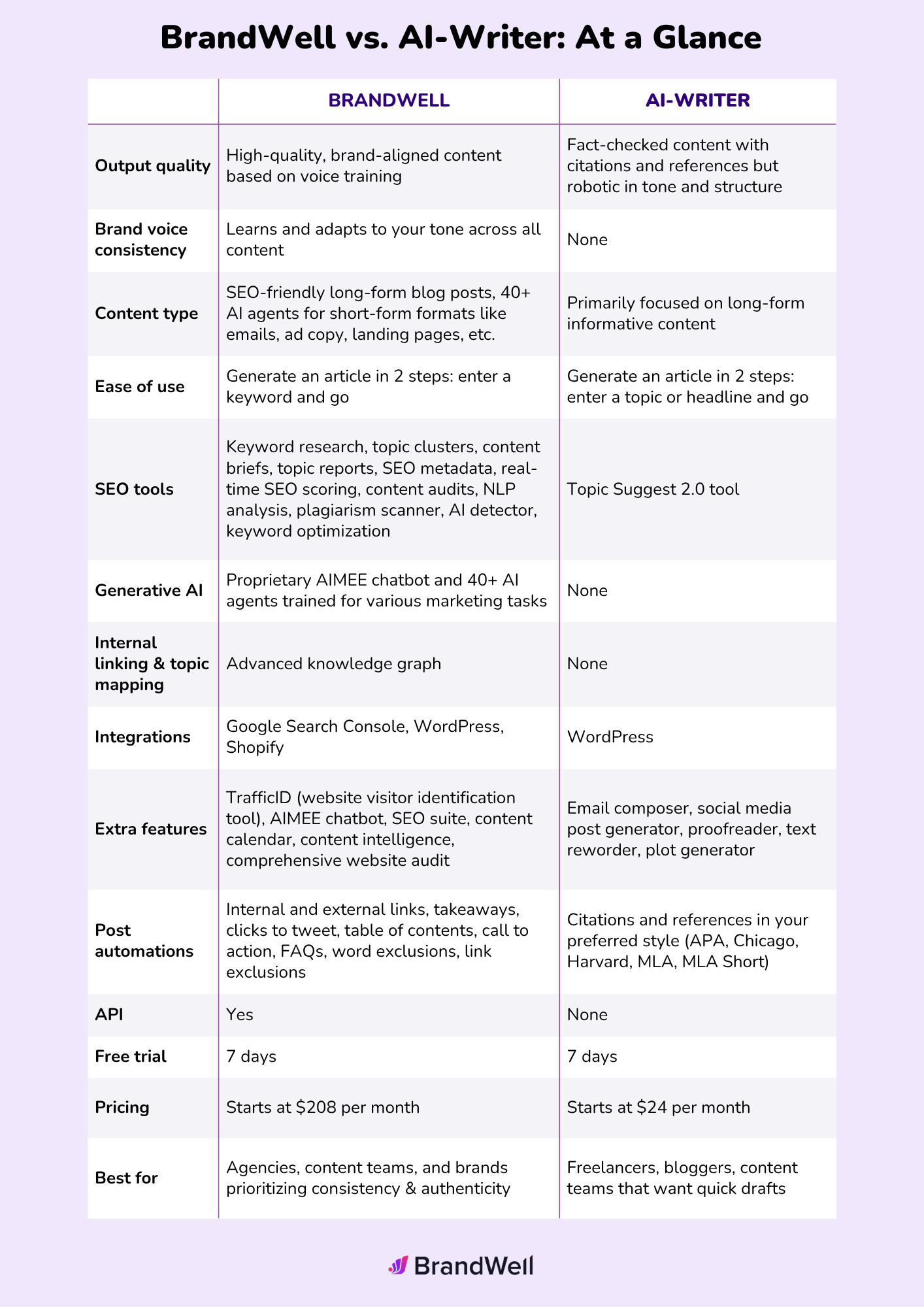
BrandWell vs. AI-Writer: Quick Overview
At first glance, BrandWell and AI-Writer might seem like they serve the same purpose: crank out blog posts faster using AI. But dig a little deeper, and tthey are quite different in focus and strengths.
AI-Writer pulls its weight in academic-style content thanks to built-in citations and summarization tools. It supports multiple citation formats and taps into live web data to fact-check sources on the fly. To use this minimalist, no-frills content generator, you simply enter a headline and it spits out an article based on curated sources. It’s fast, structured, and leans heavily on factual accuracy, but the writing can feel robotic, and customization is limited. It’s a solid pick if you just need drafts fast and don’t mind heavy editing.
BrandWell, on the other hand, has evolved into a full-blown AI content marketing suite. It’s built not just for speed, but for strategy. From long-form blog posts to short-form copy and social content, BrandWell helps you plan, write, and optimize content that performs. And unlike AI-Writer, BrandWell is designed for SEO and reader engagement out of the box. If you’re part of a content team or running an agency that needs scalable, high-quality content (not just filler), BrandWell brings way more to the table.
Inside BrandWell: What Makes It a Standout SEO Tool
BrandWell’s primary function is to create content that authentically reflects your brand voice. By using advanced AI algorithms to learn your specific writing style, it generates content that sounds as if a human writer from your team produced it.
Let’s break down the key features of BrandWell.
RankWell: The One-Click Long-Form AI Writer
If you’ve ever used an AI writer that “optimized for SEO” by just stuffing your keyword into an H1 and calling it a day, you already know how bad that can go.
RankWell, BrandWell’s built-in SEO engine, actually gets it.
Unlike surface-level optimization tools, RankWell goes deep into your competitors’ content, revealing real keyword opportunities and not just checklists with random keyword suggestions.
Here’s what RankWell does under the hood:
SERP Intelligence That’s Actually Intelligent
RankWell scrapes the top-ranking pages for your keyword and gives you a breakdown of what’s working, including headers, word counts, internal linking, NLP keywords, and even content gaps. It’s like having a mini SEO analyst baked into your content flow.
Smart Suggestions While You Write
Instead of dumping all the SEO recommendations up front, RankWell guides you as you write. It shows you how to improve readability, what semantic keywords are missing, and how to improve your topical authority, all without interrupting your flow.
Real-Time Score That’s More Than Just a Number
The optimization score in RankWell is aligned with what Google is currently ranking. So when it says you’ve got a “90/100” post, that actually means something.
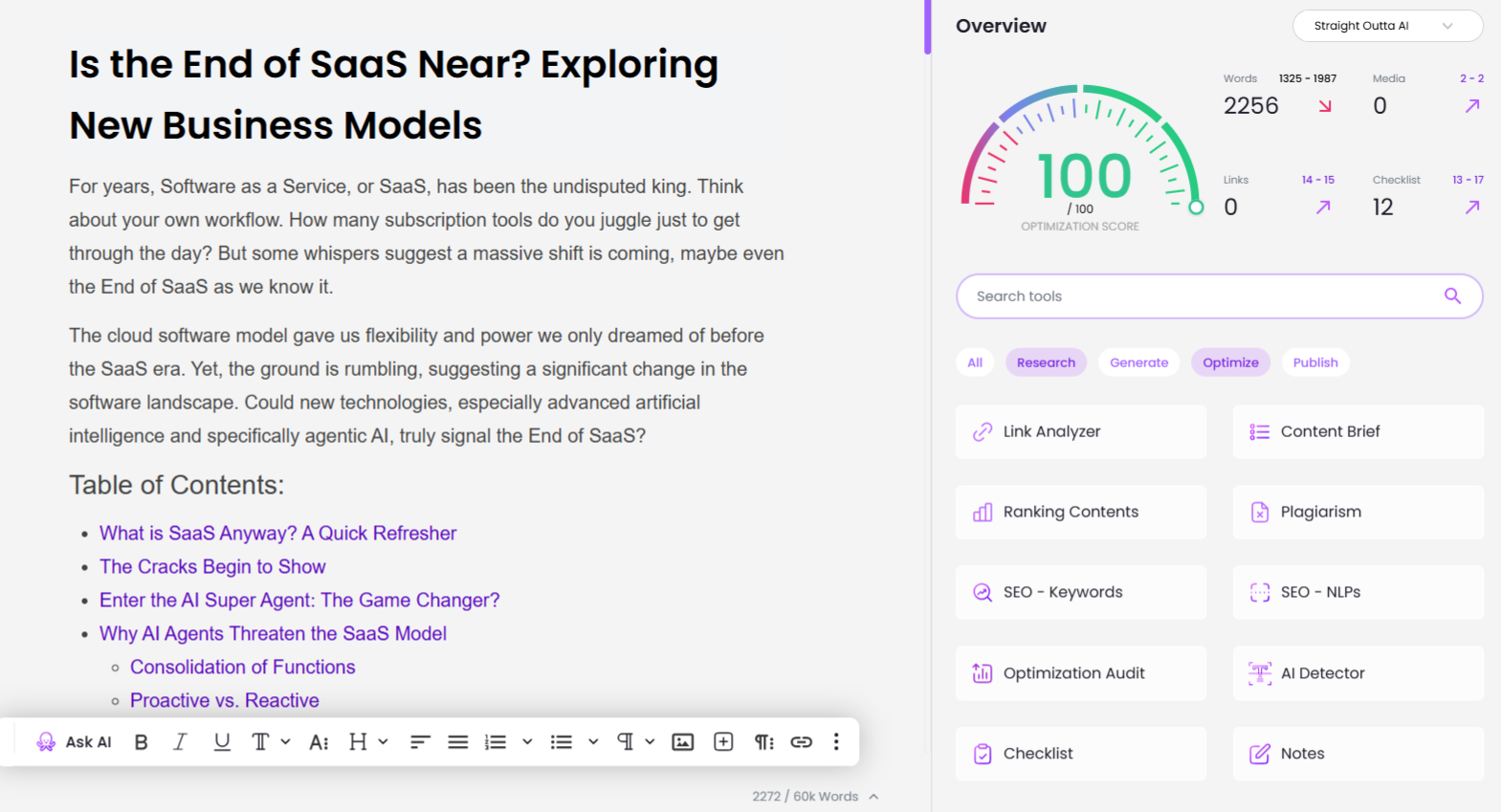
WriteWell: Your Multi-Agent AI Content Studio
WriteWell is BrandWell’s versatile short‑form and marketing copy suite. It’s your go-to writing assistant for creating any content, from tweets and ad copy to email subject lines and social posts. With WriteWell, you’ll have an army of 40+ specialized AI agents at your disposal, each with its own purpose and tone.
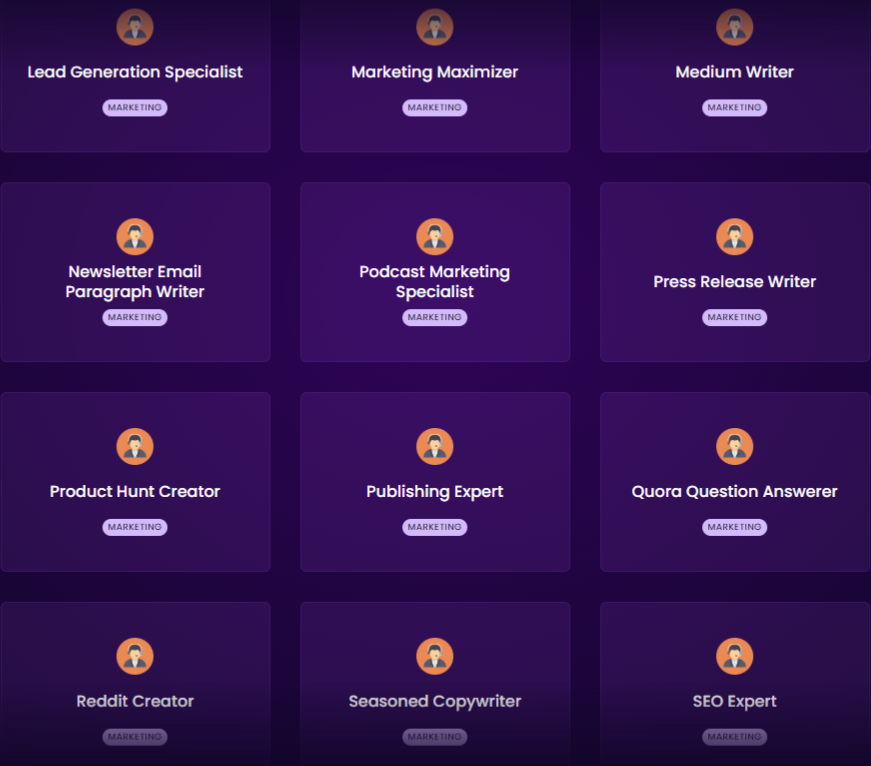
Why It Matters for Marketers & Agencies
- Brand voice stays consistent: Each AI “agent” can be trained on your voice, so whether it’s a LinkedIn update or landing page, messaging stays cohesive across channels.
- Speed + variety: Generate quite literally any short or mid‑length marketing piece (ads, emails, sales letters, even e‑book snippets) in seconds, without needing dozens of separate tools.
- Better than a template: Beyond simple fill‑in‑the‑blanks, WriteWell adapts tone, audience, and context based on your project, so output feels strategic, not formulaic.
WriteWell isn’t just another copy‑generation tool. It’s a complete content studio for developing all your marketing content: short-forms, campaigns, collateral, you name it. With specialized AI agents, brand‑consistent voice, and real-time editing tools, WriteWell empowers busy marketers and agencies to produce high-impact messaging with less hassle and more strategic power.
Content Intelligence: Your Data-Driven Content Command Center
Content Intelligence is where BrandWell ties everything together. Think deep research, intelligence, and analytics powering every piece of content you create.
Keyword Research & Topic Clustering
Dive into search volume, CPC, keyword difficulty, and related topic clusters, all within the BrandWell platform. No need for separate tools or juggling spreadsheets. Clustered topics guide your H2s/H3s, so you write for authority, not just keywords.
Topic Reports & Content Briefs
Generate locale-specific, real-time reports analyzing the top 50 ranking articles for your keyword, covering readability scores, content gaps, word counts, and headings. Instantly turn these into structured content briefs you can hand off to writers or feed directly into RankWell.
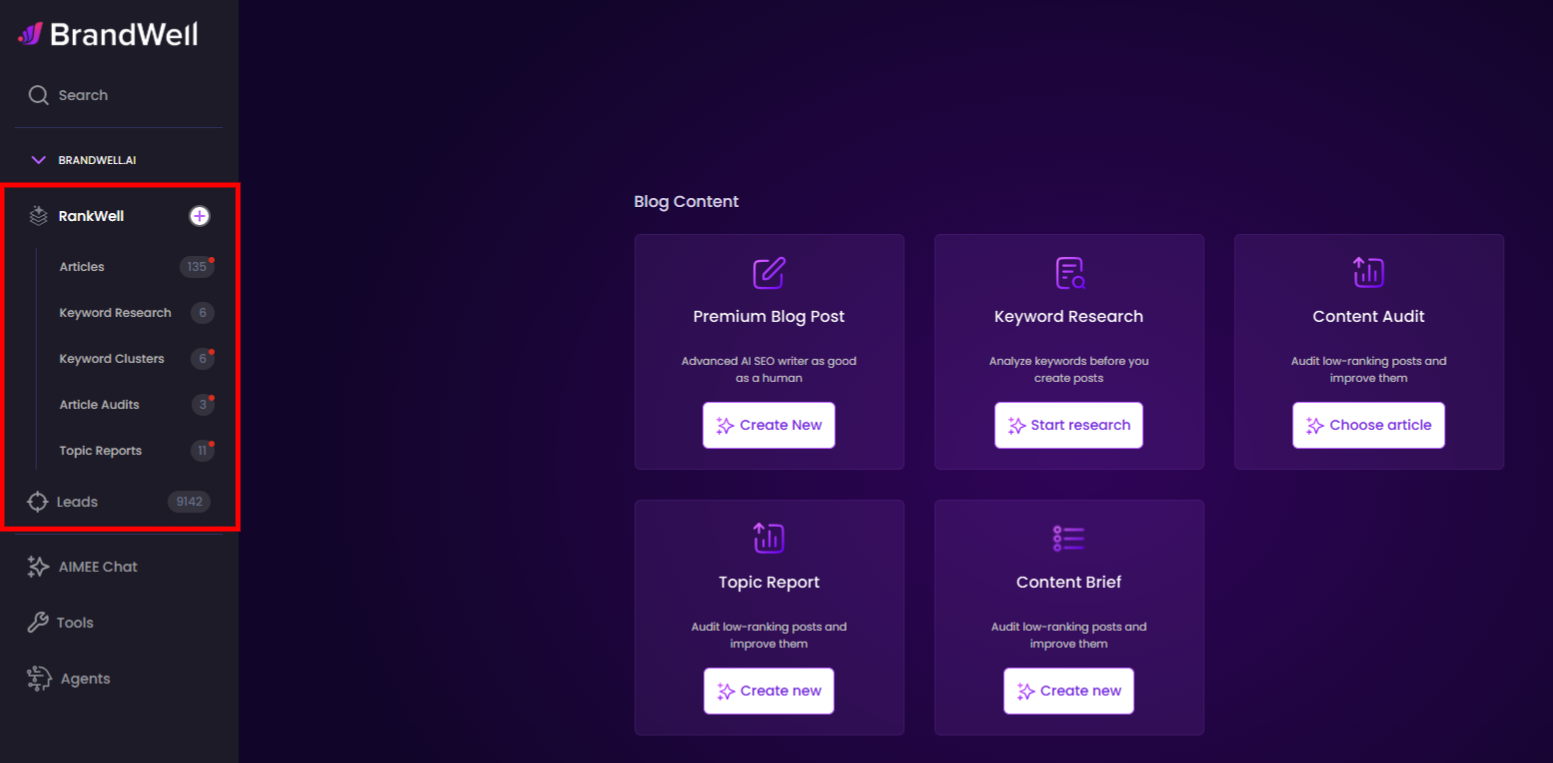
Optimization Audits
Run audits on both new and existing content so you can:
- See where your content is underperforming
- Score it against top-ranking pages
- Receive a step-by-step checklist
Then rewrite with RankWell to close those gaps fast.
Knowledge Graphing & Natural Backlinks
Every time you add a project/client to BrandWell, it will analyze your entire site, understand its context, and build a brand knowledge graph. This powers internal link suggestions and lays the groundwork for natural external backlinks through its Brand Publisher Network.
Plagiarism & AI-Detection Safeguards
Because original content matters, BrandWell has developed its own AI detector and plagiarism checker, which are both built into the unified editor to ensure the uniqueness of every article it generates. The AI detector flags overly synthetic phrasing, helps you humanize the tone, and safeguards your brand’s integrity.
Why Marketers & Agencies Will Love It
- All-in-one SEO research suite: No more switching between keyword tools, ranking analyzers, clustering platforms, or audit apps. It’s all inside BrandWell.
- Faster growth, cleaner workflows: Cut research times from days to minutes while keeping content tightly aligned with what actually ranks.
- Scalable content strategy: Agencies can roll out SEO-first campaigns across clients without losing quality, consistency, or insights.
Content Intelligence is BrandWell’s secret sauce. It’s where strategy meets scale. The tool doesn’t leave anything to guesswork: you get research, planning, content creation, optimization, and integrity checks all under one roof. For marketers and agencies juggling multiple campaigns, this is the difference between winging it and running a content machine.
BrandWell offers small businesses and individual content creators a pathway to maintain a professional and consistent voice without having to maintain a large marketing team. It helps in crafting everything from detailed product descriptions to engaging media posts. The emphasis is on quality content that resonates with your target audience by mirroring your unique communication style.
Inside AI-Writer: What You Get (and What You Don’t)
While AI-Writer.com isn’t trying to be a full marketing suite like BrandWell, it does have a few core features that appeal to content teams looking for quick, clean drafts. It focuses on fact-based content generation using curated sources, but that comes with both strengths and trade-offs.
Let’s break it down.
1-Click Articles: The Speed Demon
AI-Writer’s flagship feature is exactly what it sounds like: type in a headline or keyword, click a button, and it generates a full-length article, complete with cited sources, within minutes. It’s a solid option for when you need quick drafts or outlines to work from, especially for informational content. The built-in citations also make fact-checking easy and add a layer of credibility.
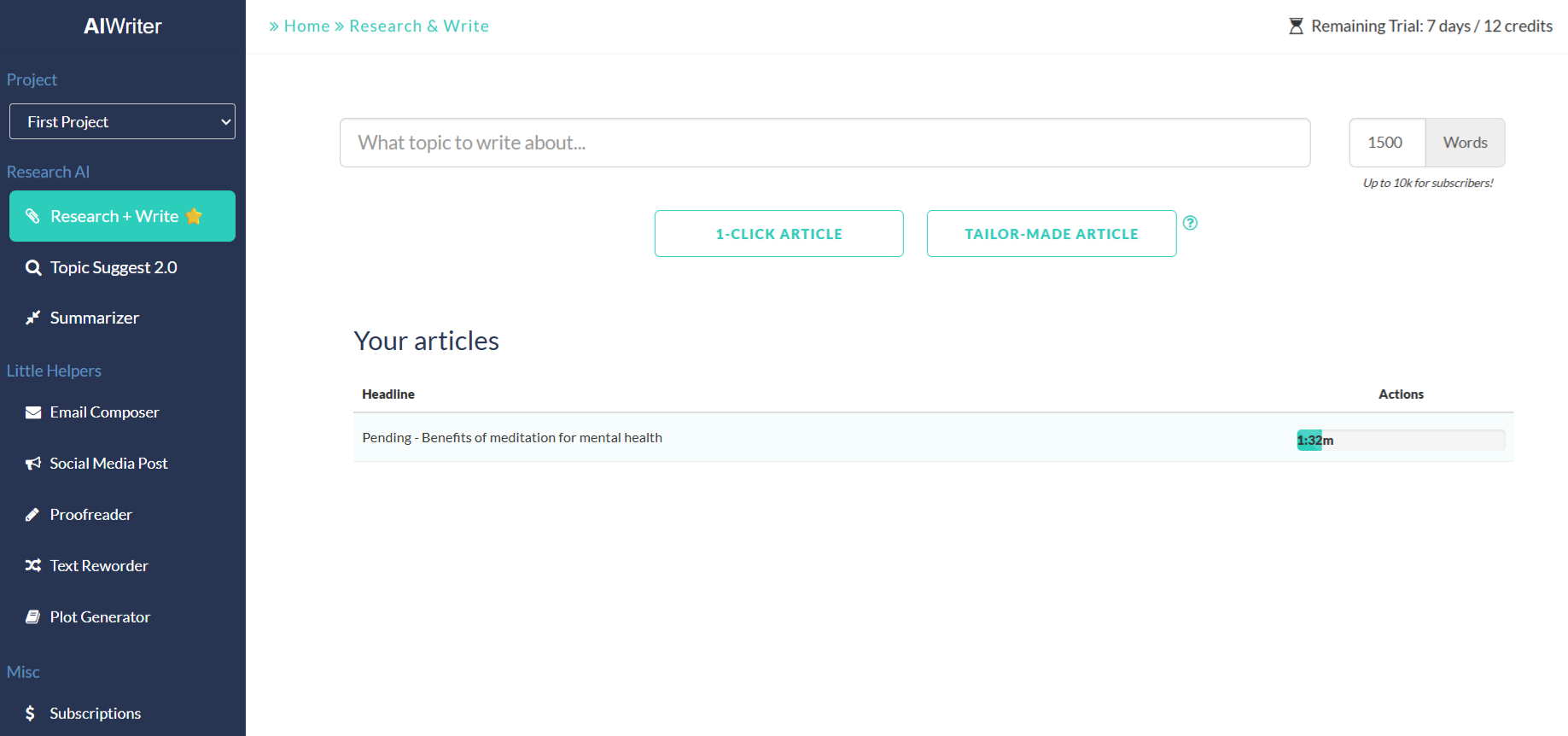
But while the speed is impressive, the output often sounds stiff and robotic. The writing lacks natural flow and voice, making it feel like it was written by a machine rather than for a human. You’ll likely need to rewrite or heavily edit if you’re aiming for audience engagement, brand alignment, or content that actually converts.
Tailor-Made Articles: A Bit More Control
Tailor-Made Articles offer more customization than the 1-Click option, allowing you to define structure, keywords, and specific content needs.
You can choose subtopics and citation styles (APA/Chicago/Harvard/MLA) and outline key points, allowing for more targeted and relevant pieces.
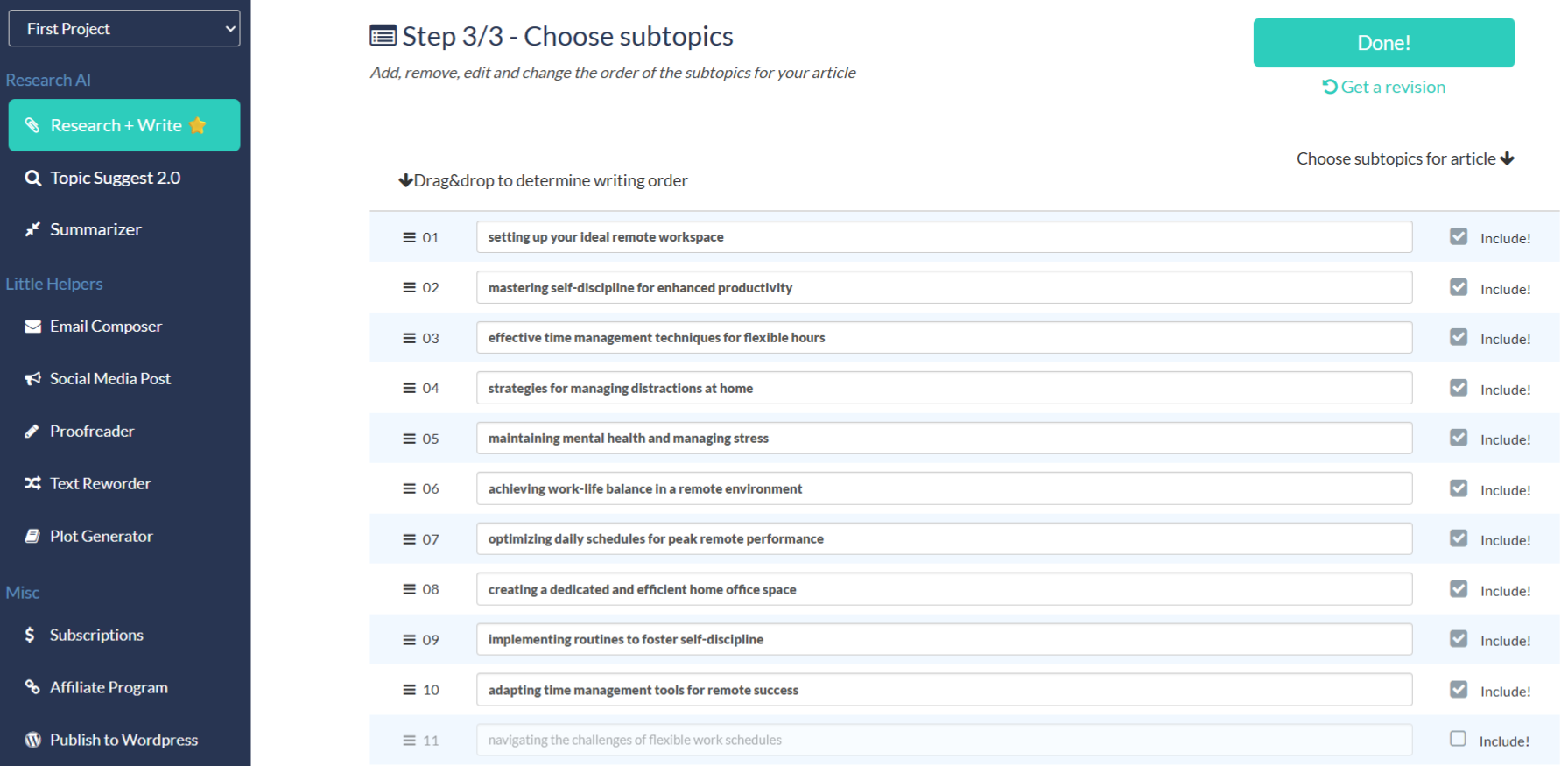
This feature is ideal for marketers who want a bit more say in how the article is shaped, and it can save time during the initial drafting process. It strikes a balance between fully automated content generation and the detailed requirements of manual writing.
That said, even with the added flexibility, the output often falls short in terms of voice and depth. It doesn’t truly “understand” brand tone or user intent the way more advanced platforms do. SEO functionality is also noticeably absent, which means you’re still creating content in a vacuum.
Topic Suggest: Brainstorming Assistant
Topic Suggest 2.0 helps break writer’s block by generating content ideas based on keywords or niches you provide. It is an excellent tool for content planning and brainstorming new angles for blog posts or social media content.
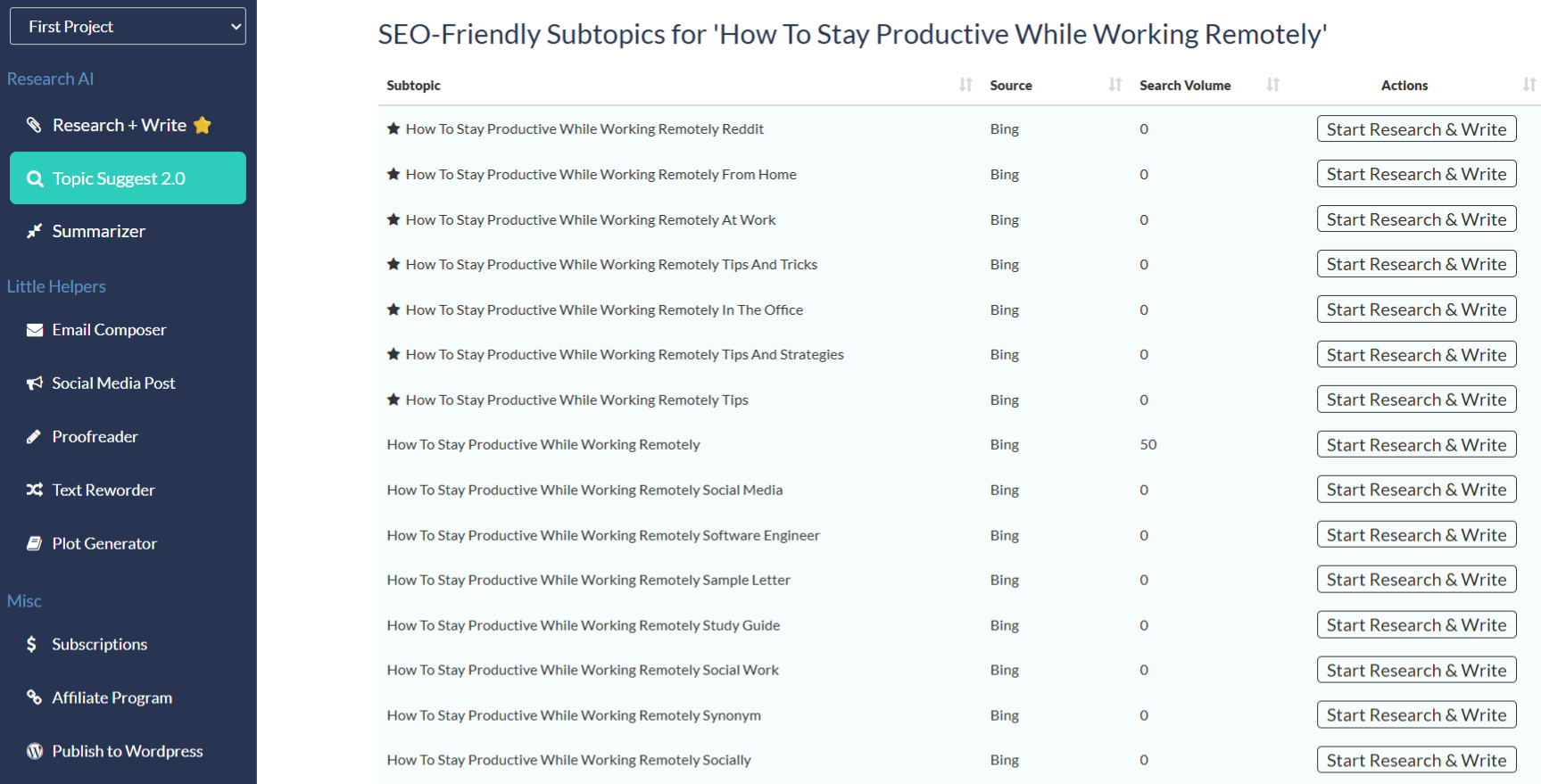
For marketers or agencies managing multiple blogs, it can help plan editorial calendars or bulk ideation sessions.
However, the suggestions can be repetitive or overly generic. There’s no deep SERP analysis or keyword clustering behind the results, so while it’s useful for basic ideation, it lacks the strategic insight needed for long-term SEO planning or topical authority building.
Summarizer: Handy Text Rewording
AI-Writer offers simple tools for rewording and summarizing text. These come in handy when you want to repurpose content, say, turning a blog post into a social caption or condensing a long article into a digestible overview.
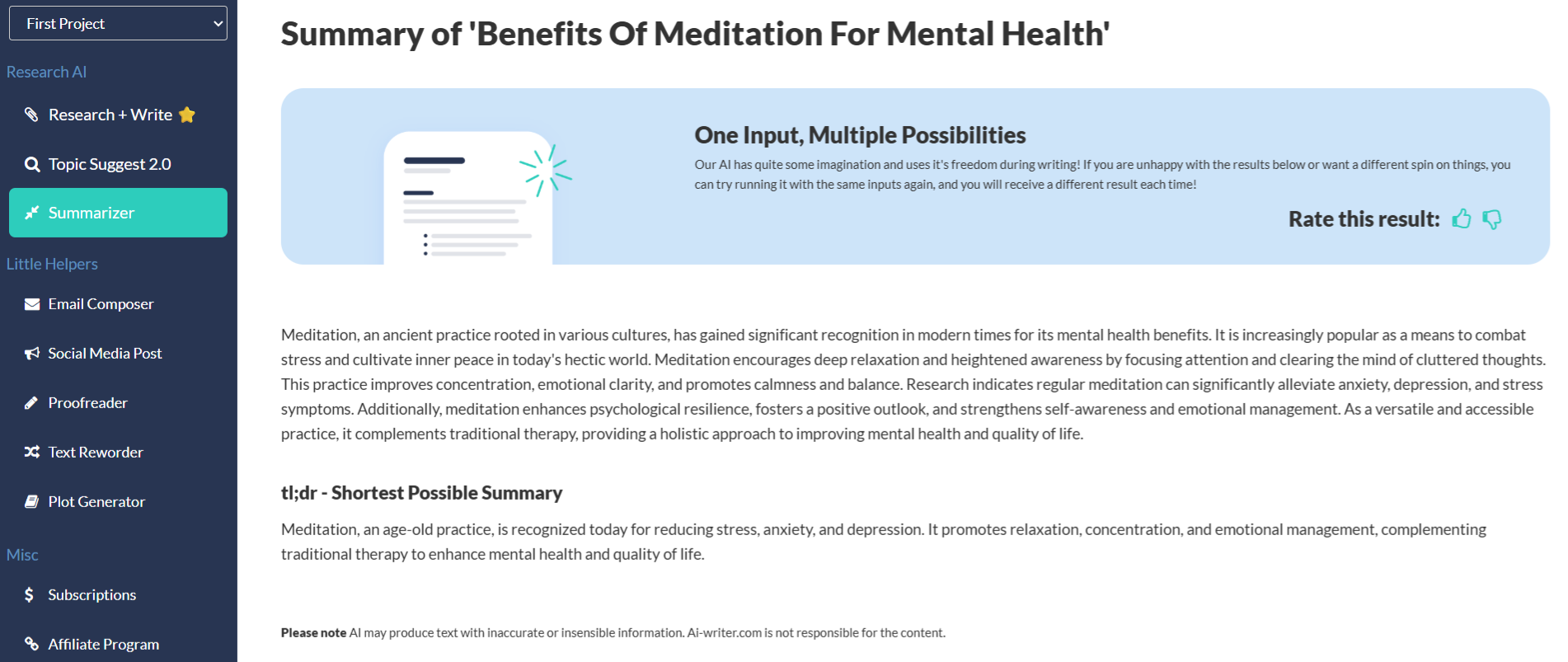
The summaries are generally accurate and effectively capture the main points of the source material. This feature saves considerable time when you need to understand or convey large amounts of information quickly. For busy professionals or students, this can be an easy way to create abstracts or introductions for longer pieces.
Still, these tools are pretty bare-bones. They don’t adjust for tone, audience, or brand voice, and the rewrites often require manual polish. They’re good for internal drafts or rough edits, but not reliable enough for polished, client-facing material.
Little Helpers: Handy Extras for Quick Content Tasks
While AI-Writer focuses mostly on long-form content, it also offers a handful of mini-tools under the “Little Helpers” tab. While not exactly revolutionary, they are convenient if you’re already on the platform.
- Email Composer – Generates basic email drafts from short prompts. Works fine for generic outreach or internal updates, but lacks personalization or tone control.
- Social Media Post Generator – Spins out simple social captions from a topic or keyword. Outputs tend to be generic, so you’ll likely need to tweak for voice and engagement.
- Proofreader – Runs a light grammar and style check on your text. It catches surface-level issues but doesn’t offer in-depth editing like Grammarly or Hemingway.
- Text Reworder – Rewrites sentences for variation or clarity. A decent tool for avoiding repetition or rephrasing AI-detectable content, though it’s not always context-aware.
- Plot Generator – A fun, experimental tool that creates fictional story plots. Not really useful for marketing, but could spark ideas for creative writers or content brainstorms.
If your main goal is to generate quick, fact-based drafts with minimal input, AI-Writer is a capable (if somewhat mechanical) tool. But for marketers and agencies who care about brand voice, SEO performance, and polished deliverables, it’s more of a starting point than a full-fledged solution. You’ll get speed, yes, but you’ll likely spend that saved time on rewrites.
How BrandWell and AI-Writer Compare
Having explored the individual offerings of BrandWell and AI-Writer, a direct comparison is useful. This will help illustrate their differences and assist you in selecting the most suitable AI writing tool for your specific requirements. We will look at aspects like content quality, user interface, and customization.
Content Quality
When it comes to content that actually sounds good and performs well, BrandWell’s output seems to be more researched. Its writing feels natural, engaging, and tailored to your brand voice. It’s also optimized for SEO right out of the gate with its RankWell engine, so the content is not just enjoyable to read but built to rank and convert.
In contrast, AI-Writer focuses on generating factually accurate drafts, which often feel robotic. You’ll get structured paragraphs and sources, but you won’t get punchy hooks, persuasive flow, or narrative finesse. Great for first drafts, not great for final versions.
AI-Writer’s output is strong on information, but may require stylistic adjustments to match a specific brand personality.
Both tools utilize natural language processing, but their optimization goals differ. BrandWell optimizes for brand consistency, while AI-Writer optimizes for information accuracy and speed. The “best” content quality depends on whether your priority is brand voice or rapid, informational content generation.
Verdict:
BrandWell delivers high-converting, brand-ready content.
AI-Writer is best for raw, research-based drafts that need polishing.
Ease of Use and User Interface
BrandWell typically requires an initial learning phase as the AI needs input to understand and replicate your brand voice accurately. This includes describing your website context and target audience, and uploading samples of your existing work. Once this setup is complete, the day-to-day content creation is just as easy as one click.
BrandWell’s interface is clean, modern, and built for real-world workflows. Whether you’re managing a blog, repurposing a press release, or generating short-form copy, you can access all the tools you need in a unified editor. The AIMEE chatbot also makes it easy to generate or tweak content on the fly, without learning complicated prompts.
AI-Writer’s interface is extremely minimalist (almost to a fault). It’s easy to use because there’s not much to do beyond generating articles. That simplicity is appealing for users who just want a draft and don’t need bells and whistles. But if you’re managing multiple clients, brand voices, or campaigns, it feels limiting fast.
For those who prefer a minimal learning curve, AI-Writer might be more appealing. However, users who are willing to invest time in setup for a more personalized output may find BrandWell’s approach rewarding in the long run. The choice often comes down to immediate usability versus long-term brand alignment.
Verdict:
BrandWell balances power and usability for content teams.
AI-Writer is beginner-friendly but bare-bones.
Research Capabilities
AI-Writer excels in research. It is proficient at gathering information from a wide array of online sources and compiling it into coherent, informative articles. This makes it a strong AI writer for topics requiring factual accuracy and supporting data. Although its research capabilities help build topical authority, there is zero insight into competition, keyword difficulty, or ranking potential.
BrandWell goes beyond topic research. With content intelligence, topic clusters, and content briefs, BrandWell gives you the kind of analytics depth you’d normally need 3+ separate SEO tools for. You can cluster keywords, audit competitors, generate optimization reports, and even fix existing content with one click.
Verdict:
BrandWell = deep SEO strategy.
AI-Writer = topical research with cited sources.
Customization & Brand Voice
With BrandWell, customization is built into its DNA. You can train the system on your brand tone, set up reusable content structures, and use specialized agents for different content types. It adapts to your specific brand guidelines to ensure that all generated content sounds like it came directly from you. This level of personalization is its core strength, making it one of the AI tools favored for brand-centric marketing.
AI-Writer offers some light customization with Tailor-Made Articles, letting you tweak structure, subheadings, tone, and keywords. But the results are often inconsistent, and it still lacks true voice adaptability. You don’t really get the sense that it “understands” your brand.
If your main goal is content that perfectly mirrors your brand’s unique communication style, BrandWell offers more in-depth options. If your focus is on structuring informational content according to specific outlines or keyword targets, AI-Writer provides robust tools.
Verdict:
BrandWell nails voice, tone, and flexibility.
AI-Writer sticks to a rigid structure and a generic tone.
Output Volume and Content Production
When it comes to scaling content production, BrandWell gives marketers serious firepower. With a bulk upload feature, you can turn 100 keywords into long-form blog posts in just minutes instead of days!
The platform also supports high-volume agencies with client workspaces, bulk content audits, and rewrite automation. Whether you’re running weekly blog campaigns or churning out product descriptions for thousands of SKUs, BrandWell is built for scale.
Meanwhile, AI-Writer excels at single-article generation. You can create a solid long-form draft in under 10 minutes, but it’s a one-at-a-time process. There are no content pipelines, multi-format workflows, or built-in tools to manage large volumes. Although it’s fast, it’s not built for scale. If you’re handling content for multiple clients or looking to publish daily, you’ll hit a ceiling fast.
Verdict:
BrandWell is production-grade content at scale.
AI-Writer is fast for solo tasks but not built for volume.
Integrations and Workflow Efficiency
BrandWell supports a growing number of integrations (e.g., WordPress, Shopify, Google Search Console, Google Docs, Microsoft Word, etc.), and its built-in tools like plagiarism detection, AI detection, and internal link suggestions make it a legitimate all-in-one content workflow hub.
AI-Writer doesn’t integrate with much. You can copy or export articles and publish directly to WordPress, but that’s about it. There are no analytics, collaboration features, or publishing workflow support. It’s more of a standalone tool you bolt onto your existing process, not one that replaces parts of it.
Verdict:
BrandWell fits seamlessly into modern content ops.
AI-Writer is more of a utility tool than a workflow solution.
Customer Support
BrandWell takes support seriously. I’ve reached out a few times, once for help troubleshooting a publishing error, and another time to clarify some features in RankWell. Both times, I received a prompt response from a real human who knew the product inside and out. Their support is baked into the tool with chat, email, and onboarding guides that teach you how to maximize the platform.
On top of that, they offer white label and hands-on agency support if you’re on higher plans. For marketers or teams managing multiple brands, that’s a big win.
AI-Writer, on the other hand, is more of a self-service experience. There’s a basic knowledge base and a contact form if you need help, but responses can be slow and generic. I submitted a support ticket about source formatting and didn’t hear back for two days—and when I did, the reply wasn’t super helpful. It’s not terrible, but it feels more like a SaaS side project than a tool built for serious teams.
Verdict:
BrandWell offers reliable, responsive support (you know there’s someone on the other end when you need them).
AI-Writer is fine for solo users who don’t mind figuring things out on their own.
SEO Optimization: How Do These AI Tools Stack Up?
If you’re serious about content performance, SEO has to be built into your workflow from the ground up. This is where BrandWell pulls ahead as a true SEO-first platform, while AI-Writer takes more of a post-hoc, patch-it-later approach.
BrandWell: SEO That Starts Before You Write
BrandWell was built with rankings in mind. Its RankWell engine doesn’t just optimize your content after the fact but guides the writing process from keyword to conclusion. With features like:
- Real-time SERP analysis
- Content brief generation based on top-ranking pages
- Topic clustering and internal linking suggestions
- Content audits with one-click optimization
- Auto-structured outlines with keyword density baked in
…it turns every writer into an SEO strategist. You can generate outlines based on real SERP competitors, identify missing subtopics, and get a visual score on how well your content aligns with ranking factors. And once it’s live, you can re-audit and re-optimize existing posts using the same toolset.
AI-Writer: SEO… If You Do the Rest
AI-Writer does some of the legwork by including source citations and generating articles based on relevant topics identified by its Topic Suggest 2.0 feature. This gives it a decent foundation for factual relevance, but there’s no built-in keyword research, no SEO briefs, and no content scoring. You won’t know how your draft stacks up against competitors, and there’s no insight into on-page structure, search intent, or optimization opportunities.
If you’re planning to take AI-Writer articles and run them through Surfer, Clearscope, or manually optimize them with tools like Google Search Console, you’ll get better results — but that’s extra lift. The tool itself isn’t designed to support SEO performance from the start.
If your goal is to rank content, not just publish it, BrandWell is built for that. It bundles research, outlines, writing, auditing, and link suggestions into a unified SEO workflow. AI-Writer is fine if you just want a draft to manually optimize later, but it doesn’t help you win on Google without outside tools.
Verdict:
BrandWell = proactive SEO built into every feature
AI-Writer = reactive SEO that’s your responsibility
AI Detection and Originality: How Human Do These Tools Sound?
A growing concern for users of AI writing tools is the possibility of their content being flagged by Google, Copyscape, or an AI detection tool. The goal for marketers is to produce undetectable AI content that reads naturally.
Let’s look at how BrandWell and AI-Writer handle this challenge.
BrandWell: More Natural
BrandWell doesn’t just write content that sounds human; helps you review content for overly synthetic phrasing and improve its readability.
It also includes a Plagiarism Checker powered by proprietary detection tech. This ensures your content is original, not just in tone, but in substance. Whether you’re editing existing content or creating something from scratch, you can verify it’s uniquely yours.
Combined with WriteWell’s natural language engine, Tone Helper, and Rewriter, BrandWell gives marketers a full-stack originality toolkit. You’re not just writing generic articles but creating content that feels human, passes tests, and ranks like it should.
AI-Writer: Clearly Machine-Written
AI-Writer’s output is factual but it reads like a textbook. The sentence structure is predictable, the tone is flat, and the content has that unmistakable AI sheen. Most AI detectors will catch it within seconds. There’s no bypassing built in, no smart rewriting, and no originality layer. What you see is what the algorithm spits out.
You’ll need to rewrite and restructure the output if you want it to pass as human, and even then, it’s a manual fix, not a platform feature.
If you’re creating content that needs to feel genuine, on-brand, and undetectable, BrandWell is the clear winner. It anticipates detection concerns and bakes humanlike output into every layer of the workflow.
AI-Writer, while fast and fact-focused, often feels like AI content from five years ago: accurate, but painfully obvious.
Verdict:
BrandWell = AI content that sounds more natural
AI-Writer = content you’ll need to make more effort to make it sound natural
Pricing: Best Value for Money?
When it comes to pricing, it’s no surprise that AI-Writer comes in cheaper. Its Basic plan starts at just $24/month (billed annually), giving solo users up to 40 articles per month with access to all features like 1-Click Articles, Tailor-Made Articles, and Topic Suggest 2.0.
If you’re running a personal blog or just need raw AI-generated drafts to refine manually, this is a low-commitment way to get started.
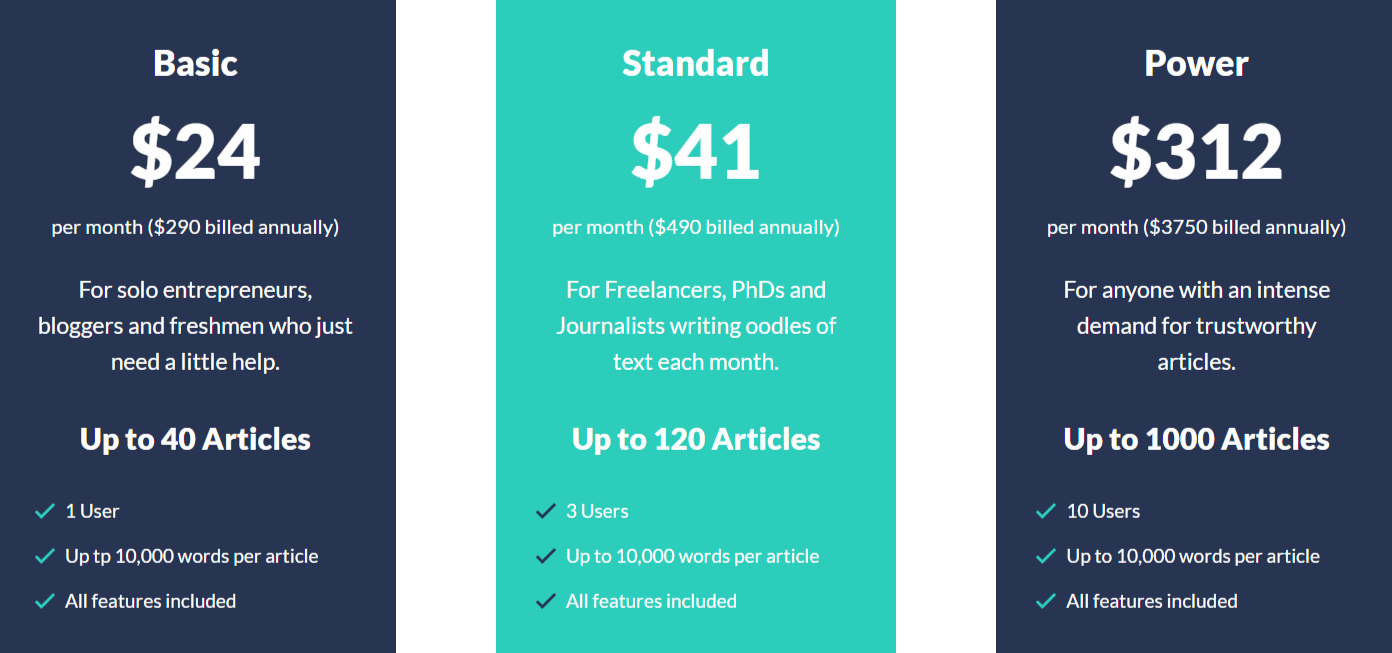
BrandWell, on the other hand, sits at the premium end of the spectrum because it’s designed for end-to-end content production, not just AI drafting. The Essentials plan starts at $208/month (billed annually), giving you access to tools like RankWell, WriteWell, AI detection, plagiarism checking, SERP-aware outlines, and even WordPress/Shopify publishing.
The Agency plan at $416/month unlocks multi-client workspaces, white-label delivery, team access, unlimited content audits, and deeper SEO automation, which is ideal for content teams managing multiple brands or clients.
And if you’re running content at scale, BrandWell’s API offers a per-post pricing model starting at $4/article, with bulk discounts available.
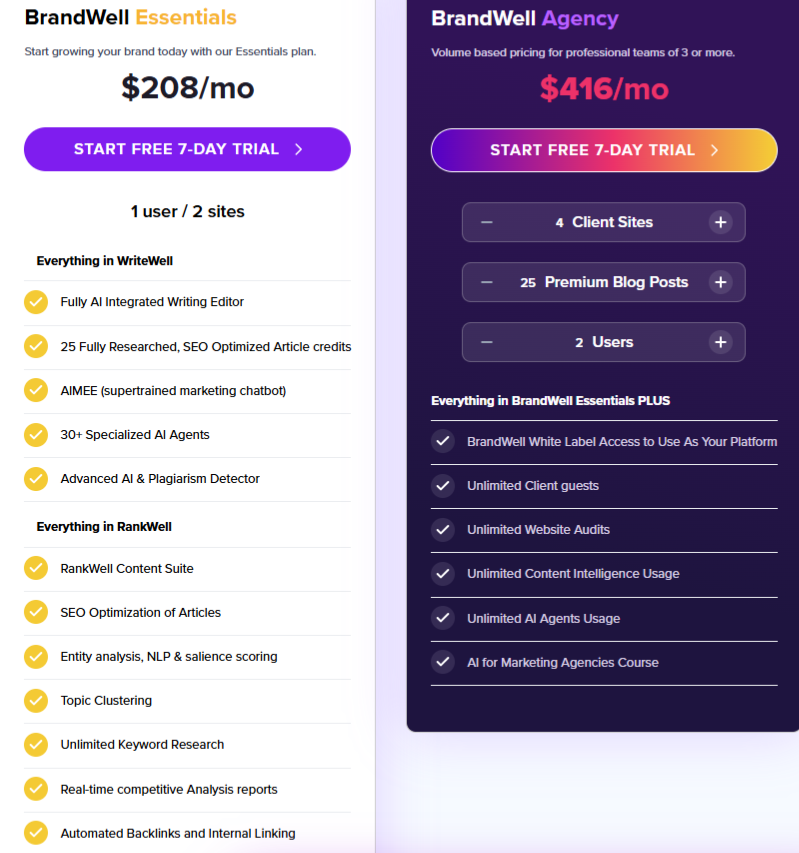
So what’s the tradeoff? AI-Writer wins on price and raw output volume. But BrandWell wins on quality, brand-readiness, and workflow automation.
For marketers and agencies who want to scale content that performs, BrandWell’s higher price tag often pays for itself in time saved, rankings gained, and clients retained.
Real-World Example: Generating Content With BrandWell and AI-Writer
Let’s say you’re creating a blog post for a client in the mental healthcare niche. The topic is “benefits of meditation for mental health.”
Here’s how that process looks in each platform:
To generate a blog post with AI-Writer, enter your headline or topic and click the “1-Click Article” button.
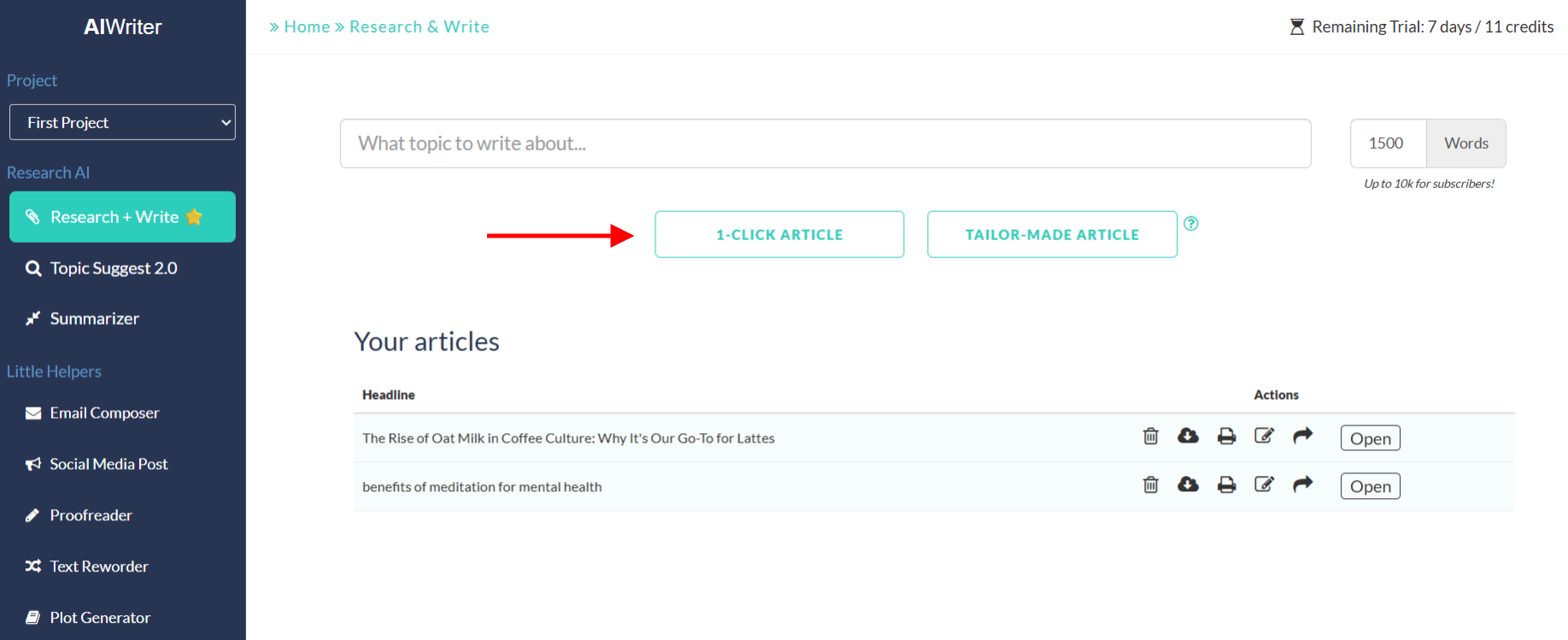
Similarly, you only need one click to generate a blog post with BrandWell. Enter your keyword or URL source and click the “Write Article Now” button.
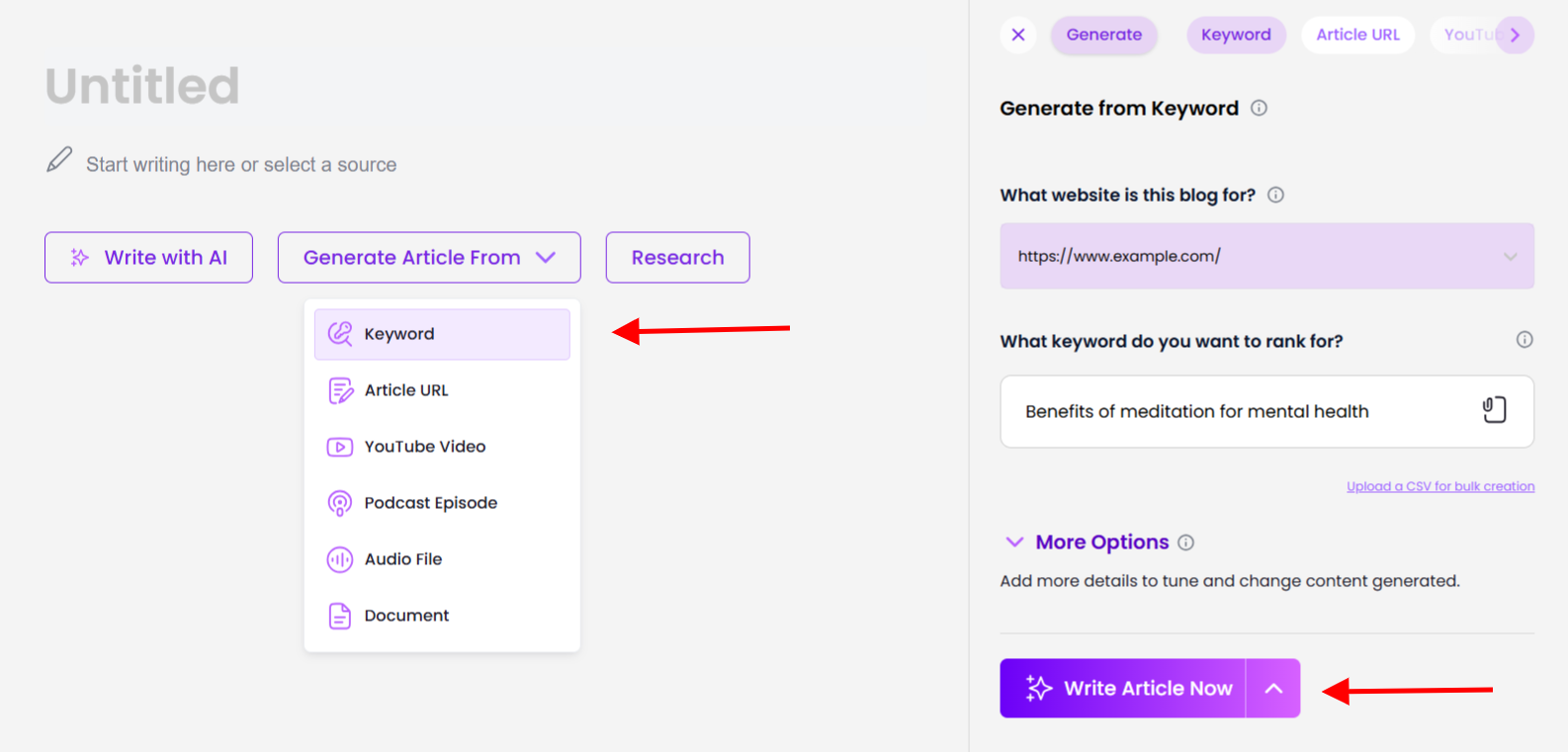
Now let’s compare the results.
AI-Writer’s article had a word count of 1,329, which is not exactly long-form by our standards. But it did provide citation sources on the right …
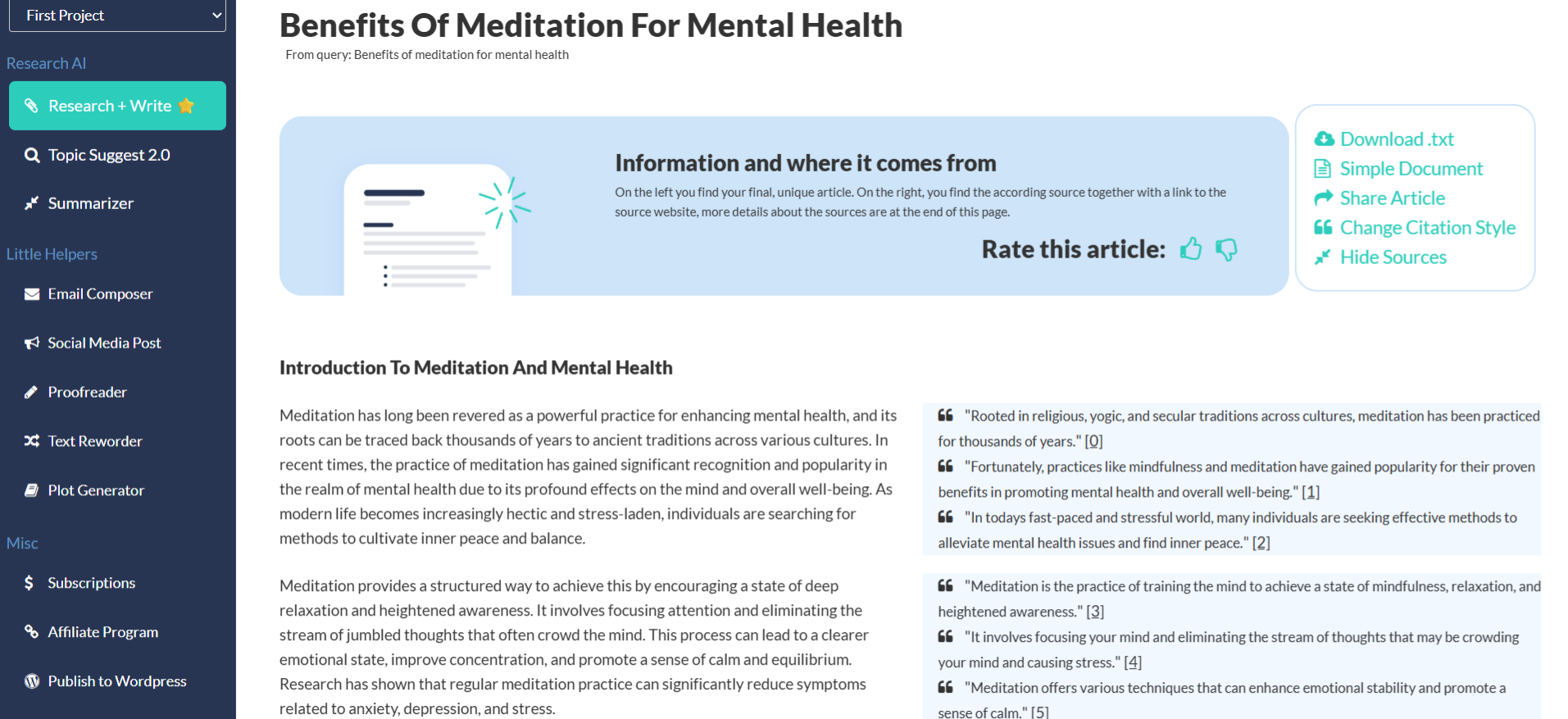
And a list of references at the bottom:
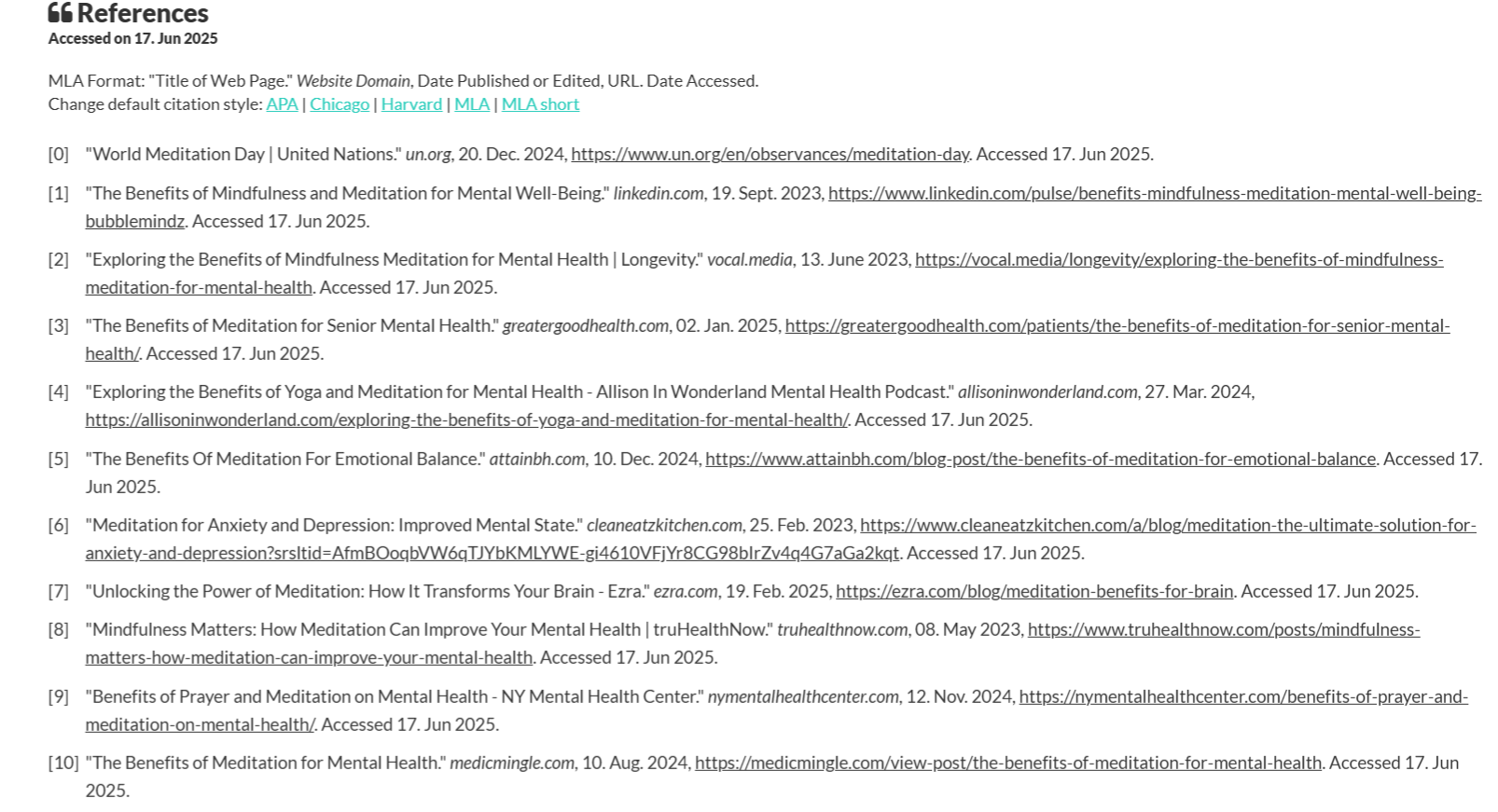
AI-Writer’s editor is very basic, with a toolbar that lets you add H1-H3 headers, bullet points, numbered lists, and links.
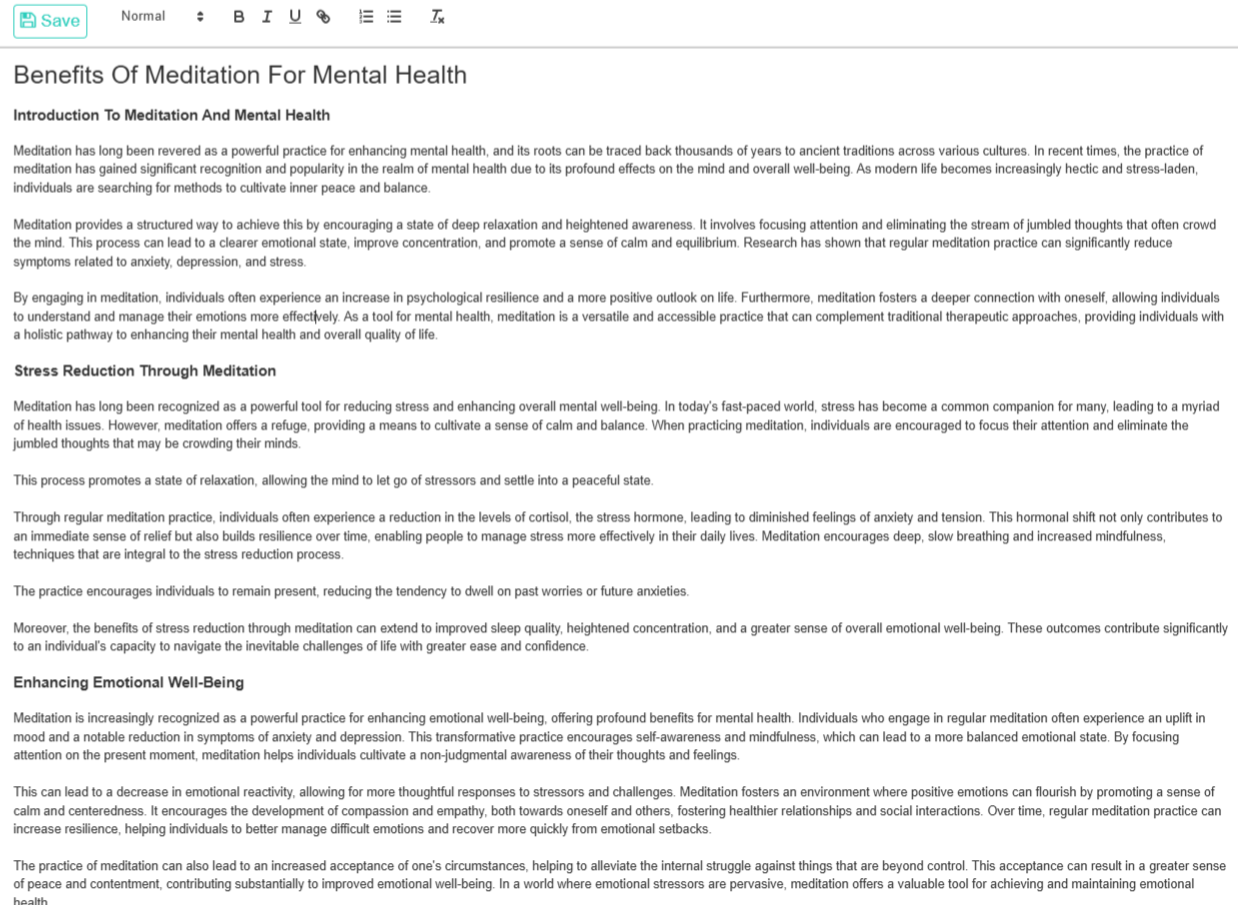
The article does a solid job of laying out foundational information in a clean, well-organized way. It’s clear and grammatically polished, which makes it easy to read. The tone is neutral and informative (almost textbook-like), which works for factual content but feels a little dry if you’re aiming to connect with a real audience, especially marketers or content professionals.
AI-Writer clearly excels at pulling together structured summaries of well-known mental health benefits like stress reduction, improved focus, and emotional regulation. However, the voice lacks personality and doesn’t bring anything fresh or human to the table.
In terms of SEO, the article includes relevant subtopics and keyword-friendly sections, but it’s not truly optimized out of the box. There’s no use of meta descriptions, no target keyword strategy, and no internal links. You’d need to run this through a proper content optimizer if you wanted it to rank.
When it comes to originality, the content avoids plagiarism, but it does show signs of AI-generated content. Certain phrases like “individuals often experience” or “has long been recognized” are repeated throughout multiple sections with only minor rewording. If you’re worried about passing AI detection tools, this article would probably flag as machine-written unless it’s significantly revised.
And for marketers or agencies trying to write content for clients, the tone is too academic. There’s no hook, no personality, no real-world examples: just straight-up exposition.
Structurally, it’s laid out cleanly with useful subheadings, and each section could stand on its own. But the formatting could be better for the web. Paragraphs are too long, there are no bulleted lists or scannable elements, and it lacks the visual rhythm of a strong blog post.
Bottom line: you’re getting a decent starting draft, but you’ll need about an hour or two to shape it into something publishable. That includes editing for SEO, breaking up repetitive phrasing, rewriting for tone, and optimizing for AI detection.
In short, AI-Writer gives you a competent, well-structured draft, but it reads like a Wikipedia entry, not a content asset. It’s useful for building first drafts or gathering ideas, but don’t expect it to replace a human writer just yet.
Now, let’s look at what BrandWell came up with.
BrandWell’s article has 2,448 words and is almost publish-ready with a meta description, URL, table of contents, H2-H4 headers, numbered lists, and a CTA.
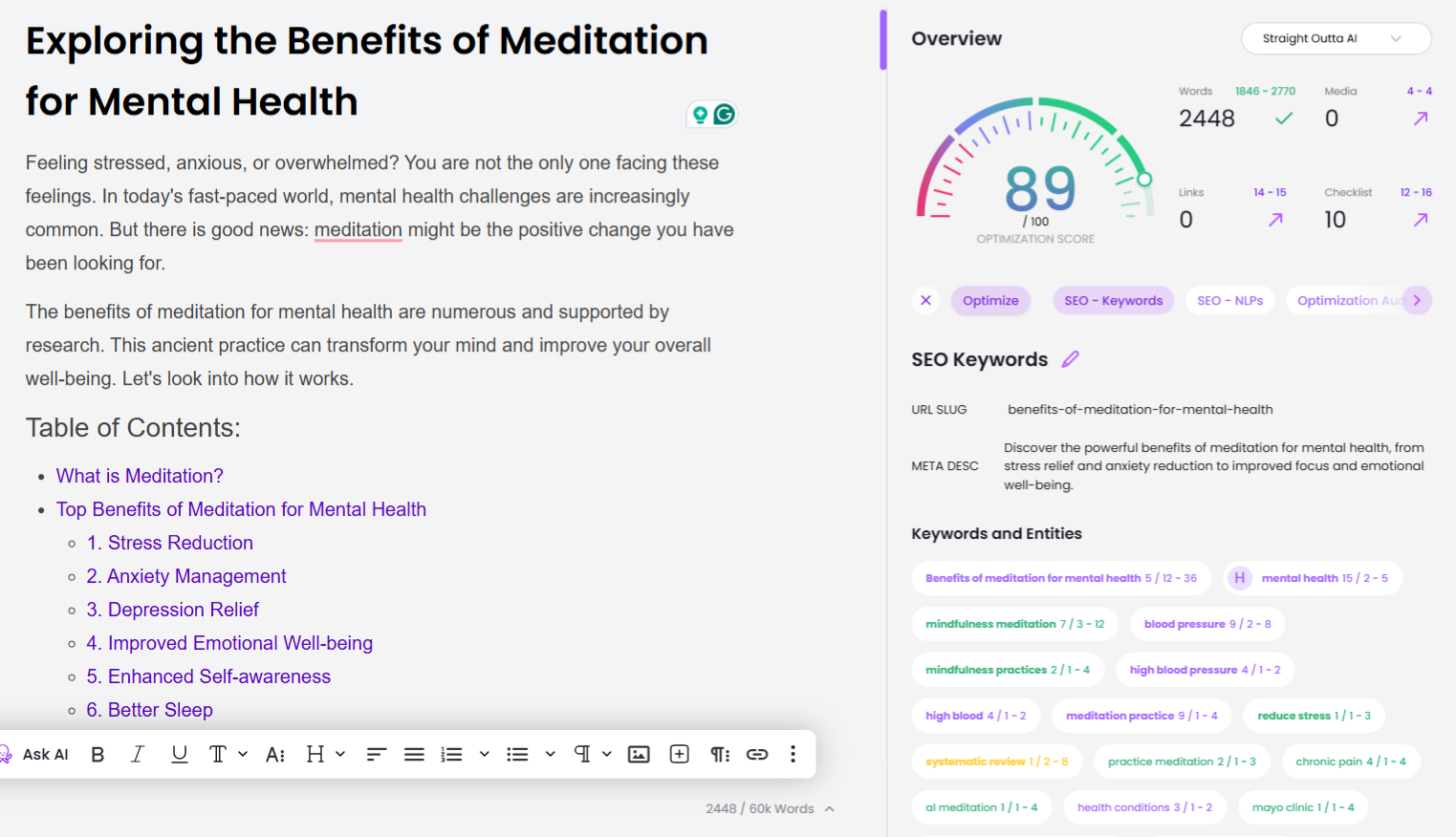
The blog post is well-structured and easy to navigate, starting with a clear introduction that empathizes with readers’ mental health struggles. It then moves into a logically ordered table of contents and a detailed exploration of each benefit, before closing with a practical guide to starting meditation and a strong conclusion.
Compared to AI-Writer’s version, which reads more like a medical blog or academic resource, BrandWell’s structure feels more human, smooth, and intentionally crafted for readers skimming or deeply reading.
The tone of BrandWell’s article is warm, calming, and encouraging, which is exactly what you’d expect from a piece about meditation and mental health. It strikes a conversational yet authoritative balance, helping the reader feel both informed and reassured. This contrasts positively with the AI-Writer article, which leaned more formal and distant. BrandWell’s use of second-person language throughout creates a sense of connection, making the experience more personal and empathetic.
BrandWell covers a wide spectrum of mental health benefits, from stress and anxiety to more nuanced topics like self-awareness, empathy, and addiction recovery. It even touches on physical health improvements like lower blood pressure without straying too far off-topic. Each benefit is backed with reasoning or research, and some even include program references like MBSR or MBCT, adding educational value.
Compared to AI-Writer, which was slightly narrower in scope and didn’t go as deep in each sub-topic, BrandWell’s article is more comprehensive and layered.
The writing is simple, clear, and free of jargon. Even when complex ideas like the nervous system, chronic pain, or cardiovascular health are discussed, they’re explained in an accessible way. It avoids heavy-handed technical descriptions and instead breaks down ideas into digestible, reader-friendly language. The readability here is significantly better than AI-Writer’s output, which sometimes felt like a technical manual.
While BrandWell’s piece doesn’t always cite specific studies with author names and years, it references established methods like “mindfulness-based stress reduction” and organizations like the Mayo Clinic. These subtle references help ground the article in credibility, even if it’s less citation-heavy than AI-Writer’s. For general audiences, this approach builds trust without disrupting the reading flow.
In terms of originality, BrandWell’s article adds original phrasing, analogies (like “a mini-vacation for the brain”), and thoughtful advice in the “How to Start Meditating” section. It doesn’t just list facts but interprets them, guides the reader, and anticipates objections or struggles (e.g., the normalcy of a wandering mind). This is more valuable to readers than AI-Writer’s purely factual and impersonal delivery.
The inclusion of a Table of Contents, keyword-rich subheadings (“Anxiety Management,” “Better Sleep,” etc.), and scannable formatting makes this article SEO-friendly. Sentences are short, paragraphs are tight, and each section delivers a complete idea. It could be improved slightly by trimming some repetition or length (especially for mobile), but overall, it’s well-optimized for blogs or web publishing.
Making Your Choice: BrandWell vs AI-Writer
So, which AI writing platform is right for you? It all comes down to your goals and how much you value speed vs. strategy.
Choose AI-Writer if you need to generate a lot of content fast and you’re comfortable refining the output yourself. It’s ideal for solo marketers, bloggers, or startups who want low-cost drafts to build on. You’ll get fast article generation, a clean interface, and citation-backed content. But be prepared to handle SEO, tone, structure, and AI detection on your own.
Go with BrandWell if you’re running content at a professional level and need tools that go beyond just writing. Whether you’re managing clients, building content engines for SEO, or running campaigns across multiple brands, BrandWell gives you a complete content system. From real-time SERP research and content briefs, AI detection feature, plagiarism checks, and one-click publishing, BrandWell helps you scale content that’s ready to perform, not just exist.
In short:
Choose BrandWell if:
- You require highly personalized content that aligns meticulously with your brand guidelines
- You are prepared to invest a couple of minutes “training” the AI to accurately reflect your unique style and messaging.
- You want to generate quality content that is enjoyable to read and ranks well in search engines, with minimal editing required.
Choose AI-Writer if:
- You need to produce a substantial volume of content quickly and are willing to edit and refine the output to ensure it meets E-E-A-T and SEO guidelines.
- Research-intensive articles, long-form content, or informative blog posts are a cornerstone of your content strategy.
- You prefer an AI writing tool that is relatively easy to use immediately, with a straightforward user interface.
Final Thoughts: The AI Writer You Choose Shapes the Results You Get
In the era of AI-driven content, the tool you use is not just a convenience but a strategic decision.
AI-Writer gives you speed and simplicity, great for turning out drafts in bulk. But when you need strategy, optimization, and scale baked in, BrandWell offers more comprehensive features.
It’s not just about writing. It’s about ranking, converting, and delivering content that feels tailor-made, even when it’s AI-powered. Whether you’re running an agency, managing client SEO, or building your brand’s content engine, BrandWell helps you go further, faster, and smarter.
[cm name=”no_more_shitty_content”]


